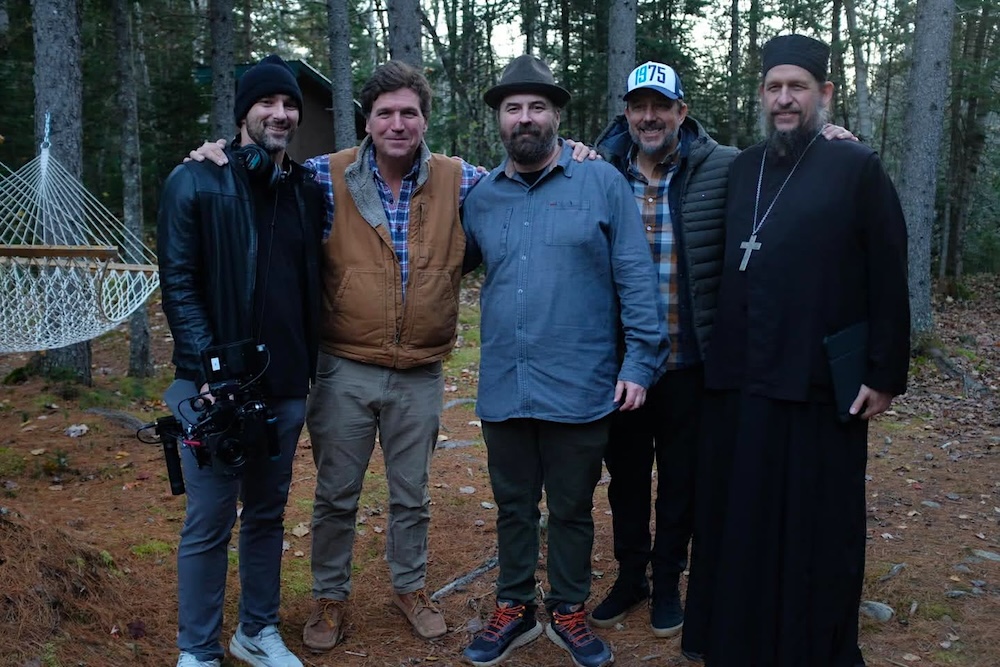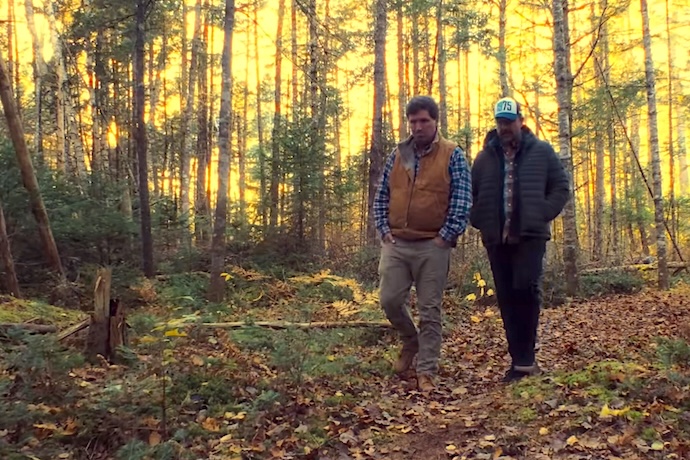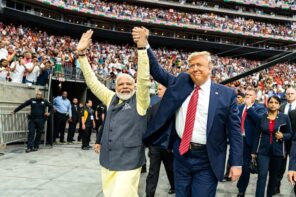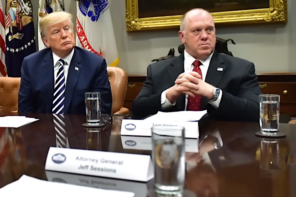“Physically mauled” is how Tucker Carlson refers to the alleged demonic assault he suffered in his own bed a year ago. Carlson’s comments, clipped from a larger documentary, have been covered by a variety of news outlets and social media accounts, with most focusing on the pundit’s own political ideology and his relationship to former (and future) president, Donald Trump. However, apart from a deep dive into the documentary itself, noticeably absent from the coverage is any sense of who Carlson’s interviewer is, and how he, John Heers, fits into the broader far-right.
This is unfortunate given that an understanding of Heers—and why Carlson opted to tell him this story—offers insight into the critical role of demonology among disparate elements of the Christian Right. Given their vocal and public suggestions that trans people are linked to a “demonic principality,” most reporting about spiritual warfare tends to focus on the New Apostolic Reformation. But the language of demons and spirits enables a variety of far-right Christians to translate their various political projects into more familiar narratives of (a new) satanic panic and Christian persecution at the hands of “demonic” politicians. This language becomes a gloss for conspiratorial ideologies concerning a range of issues—from antisemitism to the Deep State to LGBTQ rights and feminism—and helps link disparate groups that might not otherwise align theologically or socially in direct opposition to a supposed evil.
Carlson’s comments come from a larger documentary, Christianities?, hosted by John Heers and directed by Scooter Downey, an Eastern Orthodox Christian who served as an editor on the Tucker Carlson Originals series. Heers, at first blush, appears to be an ordinary philanthropist who focuses on immersion-based aid through his First Things Foundation. But a closer look at Heers reveals a man who moves in far-right social media circles, particularly within the Orthodox Church, often partnering with his brother Fr. Peter Heers, a priest of dubious canonical standing. Heers recently appeared on his brother’s “Orthodox Ethos” YouTube Channel, which has over a hundred thousand subscribers, to talk about the documentary film and its potential to help others appreciate the importance of Orthodox Christianity.
A joint project of the Heers brothers, Christianities? claims to be a documentary “delving into questions of identity and community” in order to “help viewers seeking to get to the heart of the ancient Faith.” Discussing the clip of Carlson’s demon encounter on his own YouTube channel, “Heavy Things Lightly,” John Heers proclaims that “Christians are sort of waking up to these mystical conversations.”
Recent reporting on spiritual warfare among evangelicals and charismatics (particularly with regard to social issues) has shown how vital metaphysical ideas are to the right-wing Christian vision of governance. Whether it’s Paula White’s 2020 spiritual command for “all satanic pregnancies to miscarry”; Speaker of the House Mike Johnson’s prayer that all demonic forces might be “bound”; or Sean Feucht and Mark Driscoll’s desire for “supernatural awareness” about the “demonic forces at work in politics,” across the spectrum of American Protestantism, there’s a resurgent interest in metaphysical forms of religious practice that can divine a different plan for democratic governance.
New Apostolic Reformation prophet Lance Wallnau’s proclamation that there would be an “infestation of demons” if Harris were to win the 2024 election, portrayed Democrats as literal demons. Indeed, Wallnau has repeatedly accused Harris of having “a Jezebel Spirit,” which, as Michael Heyes wrote recently, is “a literal demon called ‘The Jezebel Spirit’.” A wide variety of right-wing Christians have adopted the concept of “spiritual warfare” as another weapon with which to defend their political positionality and power.
While American Catholics, who have a history of exorcism culture, have been far less vocal about demons and spiritual warfare in the political arena, Vice President-elect JD Vance, a Catholic convert, has cozied up to numerous American Christian nationalists, including Wallnau, who believe the fight for American governmental power is just as much about angels and demons as it is about red and blue. In that light and for this crowd, Carlson’s suggestion of a demonic attack seems quite normative. What was unusual, however, was the fact that Carlson’s story wasn’t told to a charismatic Christian, but to an Orthodox Christian—and one with ties to the reactionary Right.
Carlson himself, in the interview with Heers, noted how unfamiliar he was with that type of metaphysical encounter, even calling an evangelical employee to help him make sense of it. So why then did Carlson elect to tell Heers about it rather than, say, one of the many evangelical and charismatic Christians he’s connected to? Heers set up the conversation to be about the relationship between good and evil, providing Carlson a space to riff on the topic through a personal narrative.
In the extended clip, shared by Fr. Peter Heers on his Facebook page, John Heers guides Carlson through the narrative of his “spiritual” encounter, which is intercut with footage of Carlson lighting candles and making coffee in an old wood cabin. Laughing about the event, Carlson claims the encounter led him to buy a Bible, with the disclaimer that he has “low levels of trust for Christian pastors.”
Asked by John Heers whether he thinks “God allowed the demon,” Carlson reiterates that the event doesn’t make sense, and that no one has to believe him. “I don’t care, it doesn’t matter!” he declares, arms flung high, before recalling his feeling: “so I was just, like, wow, that… that’s real.” In response, Heers calmly reinforces Carlson, saying, “It’s very real,” before arguing that the “evil presence” Tucker felt had launched something.
Conversations like these illustrate how demons and the supernatural more broadly create a common language among disparate Christian groups in order to help make sense of and/or connect their discrete political projects for American governance. Carlson, who’s previously engaged Orthodox clerics in his work of demonizing trans populations, uses the language of demons to help solidify his sense of some metaphysical terror he’s experiencing. This same language has been popular among a significant portion of right-wing Christians who fascistically assert that those who aren’t like them are demonic, and thus a threat, not only to their way of life but also their very existence.

Fr. Peter Heers (far right), poses with Tucker Carlson (brown vest), John Heers (1975 cap), and members of the Holy Wisdom Film crew. Image: Fr. Peter Heers/Facebook
Fr. Peter Heers who’s long drawn on esoteric writings of monks and holy elders to talk about spiritual warfare and demonic attacks, has consistently seen himself as a persecuted figure. This “persecution” stems both from the controversial positions he’s taken—including a critique of the COVID-19 pandemic as “anti-Christ” and calls to refute church hierarchy who supported public health protocols—and from his own tenuous canonical standing.
Fr. Heers, who has a wide following among the reactionary Orthodox community, has long had ties to the Russian Orthodox Church Outside of Russia (ROCOR). At one point he tried to be received into the Russian Orthodox Church (a.k.a. the Moscow Patriarchate) which is currently led by Putin ally Patriarch Kirill.
While the far-right Orthodox presence in the United States isn’t a powerful lobbying force, they are digitally and ideologically connected to ideologues at home and abroad. More traditionalistic strands within the Orthodox global community, including Patriarch Kirill of the Russian Orthodox Church, have used metaphysical language to describe the spiritual warfare Russia is engaged in with the Western, secular world.
The language of demons then becomes a way to speak theologically about social anxieties, about fears over the “other,” and about the fight ahead. What’s clear is that this fight ahead for Christian nationalists includes the reactionary Orthodox and their apocalyptic notions about the spiritual world—which explains why Tucker Carlson was happy to share his story publicly with Heers rather than evangelicals he would be far more familiar with. As long as the shared political anxieties of these disparate groups unite in their fear of demons, it will continue to shape the social in ways yet unknown.





